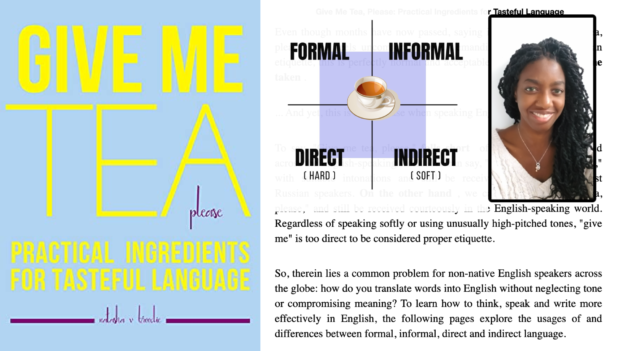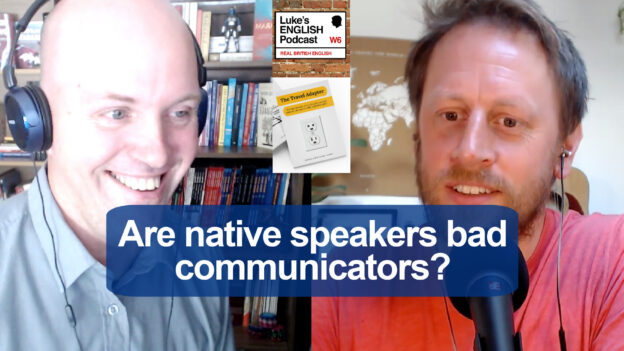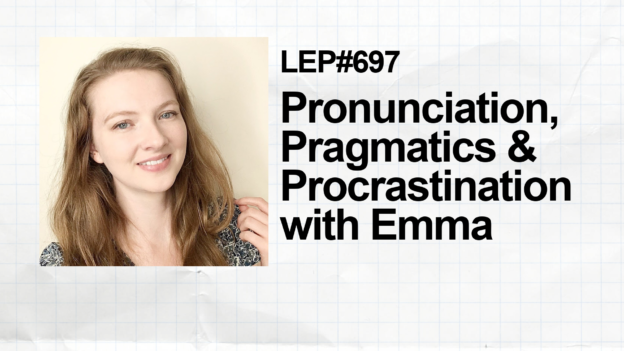Talking to Emma from YouTube channel Pronunciation with Emma about accents, improving your pronunciation, understanding pragmatics in English, and learning English through video games.
[DOWNLOAD]
Introduction & Ending Transcripts
Hi listeners, welcome to the podcast. It’s mid December and Christmas is coming very soon. I hope I find you well and in good spirits. You might be wondering about the competition results after having voted for your favourite candidates. Thank you if you did vote, that’s fantastic. I’ll be revealing the results on the podcast soon when I’ve worked out the specifics of how to proceed with the competition. Once I have worked out the details of the next step I will let you know all the results.
This episode is sponsored by LEP Premium. Go to teacherluke.co.uk/premiuminfo to get the details. Regular lessons with language teaching, memory tests for target language and pronunciation drills to work on your speaking, with plenty of stupid examples, nonsense fun and impressions too. Series 27 is currently being produced and you can expect to get episodes 3-8 in the next few weeks. teacherluke.co.uk/premiuminfo for all the details.
697. Pronunciation, Pragmatics & Procrastination with Emma
Hello listeners,
Welcome to episode 695 which is called “Pronunciation, Pragmatics and Procrastination with Emma” which is quite a mouthful isn’t it?
Can you say it? Pronunciation, Pragmatics and Procrastination.
What does this mean exactly? I’m going to tell you in this introduction.
What you’re going to hear is another conversation with a new guest on the podcast. I’ve had lots of guests on the podcast in the last few months. Here’s another one.
This time it’s Emma from the YouTube channel Pronunciation with Emma.
So, what can I say now to set up this conversation for you, and help you to enjoy it and learn from it as much as possible?
Emma is an English teacher with lots of qualifications – in language teaching and linguistics, as you will hear.
Pronunciation
The pronunciation part is that in her YouTube videos she focuses on helping learners of English improve their knowledge and use of natural English pronunciation – you know, all the different features that make up natural English speech, including things like the specific vowel sounds & consonant sounds, sentence stress, word stress, intonation, elision, connected speech, and so on.
Emma is particularly interested in pronunciation as it is one of the things that she focused on during her university studies.
So we talk about pronunciation as you might expect, with some bits about different accents and the question of what kind of pronunciation learners of English should aim for, and what kind of accent teachers should present to learners of English.
Pragmatics
Another thing Emma focused on at university was the linguistic area of pragmatics. When we think about language, we usually analyse it in terms of grammar, vocabulary or pronunciation, but pragmatics is also a very important thing to consider.
David Crystal says it’s actually the most important factor to consider when looking at how language works.
According to David Crystal, pragmatics is the study of the choices you make when you use language, the reasons for those choices and effects that those choices convey. That’s a bit abstract at this point, but we do get into some examples during the conversation, examples like how to phrase requests in English, and how different types of requests can give a different impression on the people you are talking to. Or more simply, how certain requests can make you seem more or less rude.
For example, what’s the difference between these things? And let’s imagine you’re on an aeroplane and the flight attendant wants you to put your bag under your chair. What’s the difference between making that request in these different ways?
“Put your bag under your chair” and “Please put your bag under your chair” and “Can you put your bag under your chair?” and “Could you put your bag under your chair, please?” and “Could you just pop your bag under your chair for me please, thanks.”
That could also apply to the way people use English when requesting things from me, in comments or emails, for example, as I discussed in a recent episode, if you remember, and if you don’t remember too.
So that’s the bit about pragmatics.
But this episode is called “Pronunciation, Pragmatics and Procrastination with Emma”. I’ve mentioned the pronunciation and the pragmatics, so what about the procrastination part?
Procrastination
Well, this relates to Emma’s other online English teaching channel – Procrastination with Emma, which is on Twitch.tv. Basically, Emma also does Twitch live-streams in which she plays computer games and helps people with their English while she’s doing it.
As you may know, procrastination means putting off doing other things which you have to do by wasting time doing something else. Like, for example if you have some important work to do, but you don’t want to do it for some reason, so you end up telling yourself you’ll do it later and then doing something else instead, essentially wasting your time. How do you procrastinate? Let’s say you’ve got English homework to do, but you end up spending your time playing computer games instead. Is playing computer games a waste of time? Maybe not. Maybe it can help you learn English. That’s the spirit behind Emma’s Twitch.tv gaming channel “Procrastination with Emma”.
So, stuff about accents & pronunciation, stuff about the pragmatics of how we make requests in English, and some stuff about improving your English through computer games.
Actually those things mostly come up in the second half of this conversation. The first half is spent mainly getting to know Emma, finding out the usual things like where she’s from, what her accent sounds like, how she approaches language learning (because she speaks Spanish and also enjoys learning other languages from scratch) and any tips she has about learning English.
I won’t say much more here, except that I really enjoyed talking to Emma and you should certainly check out her YouTube videos and her live streams on Twitch.
Keep listening all the way through and I will chat to you again at the end of the episode, but now, let’s get started!
Links
Pronunciation with Emma on YouTube (Pronunciation videos) – https://www.youtube.com/channel/UCNfm92h83W2i2ijc5Xwp_IA
Emma’s website (Classes & Courses) – https://pronunciationwithemma.com/
Procrastination with Emma on Twitch (Live streaming/Gaming/English) – https://www.twitch.tv/procrastinationwithemma
Ending
So that was pronunciation, pragmatics and procrastination with Emma from Pronunciation with Emma on YouTube and procrastination with Emma on Twitch. That’s quite a mouthful isn’t it, again!
Right, well I hope you got a lot out of that conversation in various ways including just general knowledge, linguistic knowledge and not to mention specific vocabulary and phrases you might have noticed.
Thanks again to Emma for being a great guest on the show.
So Christmas time is approaching fast.
Normally at Christmas I take a break for a couple of weeks, but since I’m not going back to the UK this year I might continue podcasting. I certainly have a few episodes in the pipeline and they’ll drop over the coming weeks. I might take a break in the new year but we will see.
So, episodes in the pipeline include more conversations with guests on different topics and a returning guest who is a friend of the podcast who we haven’t heard from in a while.
Also P27 parts 3-8 are coming with the usual language practise and pronunciation work. Remember all my premium series have a lot of pronunciation drills so you can improve your speaking by simply repeating after me, paying attention to certain little language features as we go. www.teacherluke.co.uk/premiuminfo
In terms of the competition. Thank you to those of you who voted. As I said before, voting is closed now and I am working on the next stage in which I will announce the winner or winners and then the next steps for things like interviews, which will probably happen in the new year.
So hold tight for the results of the competition, and thanks for voting.
That’s all I have to say at this point except that I hope you are well. Please stay safe, stay positive, be excellent to each other and I will speak to you again soon, but for now, goodbye…



